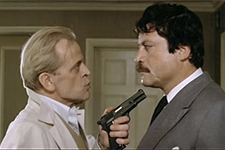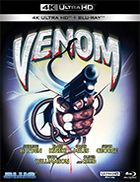Venom (1981) (4K UHD)
|  Venom, a suspense thriller set in London about a botched kidnapping made even worse by an on-the-loose black mamba snake, has all the trappings of a low-budget marquee filler, but ambitious talent manager-turned-producer Martin Bregman (Serpico, Dog Day Afternoon) clearly had other ideas in mind. He brought in an impressive international cast, which included German star Klaus Kinski (a regular collaborator with Werner Herzog), well-regarded British actors Oliver Reed (a regular collaborator with Ken Russell), Nicol Williamson, and Susan George, and veteran American character actor Sterling Hayden (in what would turn out to be his last role). Best intentions aside, the production turned out to be a disaster. Original director Tobe Hooper (The Texas Chain Saw Massacre) left (or was fired) after only ten days and was replaced with British director Piers Haggard, and Kinski and Reed, who wielded some of the biggest egos and most eccentric and volatile behavior in the business, clashed endlessly. However, the resulting film bears little of that trauma (it actually helps that Kinski and Reed’s characters are supposed to loathe each other), and it works as solid, diversionary entertainment. The story unfolds almost entirely inside a three-story Eaton Walk townhouse in the heart of London. The kidnapping plot involves an asthmatic 10-year-old boy named Philip (Lance Holcomb) whose wealthy parents are out of town, leaving him in the care of his grandfather, Howard (Sterling Hayden), a former safari leader recovering from a recent surgery; their maid, Louise (George); and their chauffeur Dave (Reed). Philip is a budding naturalist who keeps a small zoo of animals in his room, and his most recent acquisition is supposed to be a harmless African house snake. However, the animal supply company botches the order and instead sends him home with the deadly venomous black mamba, which was supposed to go to Dr. Marion Stowe (Sarah Miles), who works at the London Institute of Toxicology and exists largely to inform any otherwise uninformed viewers about just how deadly the black mamba is (not only is their bite lethal within an hour, but they are also incredibly aggressive snakes that attack first). Louise has masterminded the kidnapping with Jacmel (Kinski), a former European terrorist, although both of them are so inept in their planning that it doesn’t take the snake, which is accidentally set loose in the townhouse, to screw things up. Soon, the police, led by Commander William Bulloch (Williamson), have surrounded the townhouse where Jacmel and the others have retreated with Philip and his grandfather being held at gunpoint, and a stand-off ensues that is regularly upended by the sudden emergence (or just threatening presence) of the black mamba. The snake, which is mostly played in the film by the real deal, is actually absent from the screen for long periods of time, and Haggard derives most of the suspense from the increasingly fractious relationships among the characters, as Jacmel and Dave disagree violently about how things should be done and the lives of Philip and Howard hang in the balance. When the snake does arrive, it isn’t on screen long, but long enough to make a heady impression with its sudden, striking attacks that leave virtually no chance for escape. In adapting the novel by South African mystery writer Alan Scholefield, screenwriter Robert Carrington, whose most famous work was his 1967 adaptation of Frederick Knott’s stageplay Wait Until Dark, another single-location thriller, sticks to the basics. He understands that there isn’t always a lot of action, so the characters and their conflicts have to maintain enough interest to sustain us in-between snake attacks. The impressive above-the-line cast helps quite a bit in this regard, even though they tend to play their characters in incredibly broad strokes (no one is going to hold this film up as Kinski or Reed’s best work, although there is a certain guilty pleasure in watching them in constant conflict). The whole film hinges on an incredibly contrived scenario, which you either accept or you don’t. If you’re on-board, it works quite well, especially with the commanding musical score by the soon-to-be-prolific Michael Kamen. Despite being brought on board in the middle of production, versatile director Piers Haggard, best known for the 1971 cult horror film Blood on Satan’s Claw and the BBC’s 1978 production of Dennis Potter’s serial drama Pennies From Heaven, acquits himself well, making the most of the vertiginous space within the well-appointed townhouse and the looming threat of the unseen serpent (the warped “snake point of view” shots, however, seem pretty cheesy today, and probably did in 1981, as well). Venom may not have turned out to be the prestigious thriller Bregman clearly envisioned, but its works well enough on its own pulpy terms.
Copyright © 2025 James Kendrick Thoughts? E-mail James Kendrick All images copyright © Blue Underground | |||||||||||||||||||||||||||||
Overall Rating: 

 (3)
(3)


